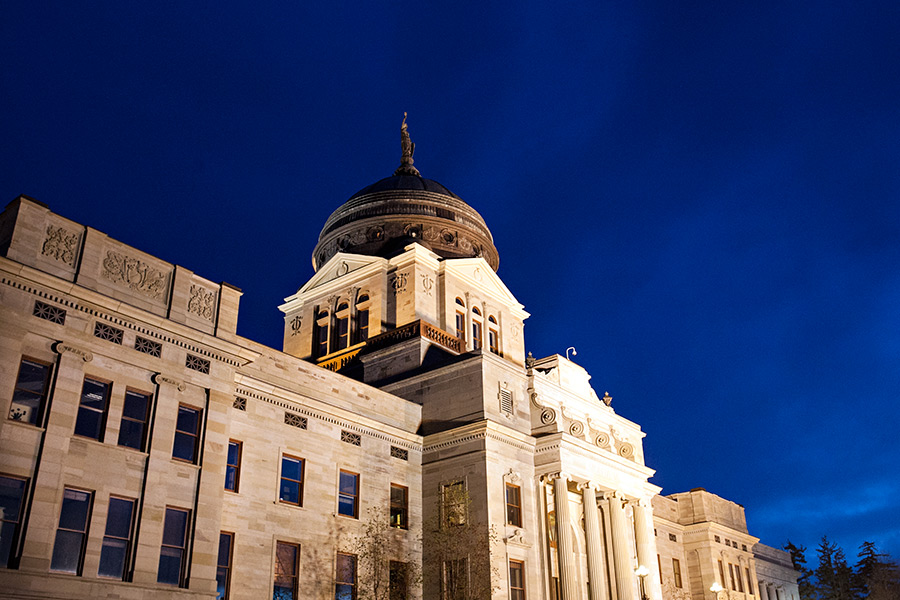HELENA — A special election will be held on May 25 to fill Montana’s only U.S. House seat after Republican Ryan Zinke resigned to join President Donald Trump’s cabinet, the governor said Wednesday.
The U.S. Senate confirmed Zinke as Trump’s Interior Department secretary earlier in the day.
Democratic Gov. Steve Bullock chose the minimum amount of time for setting a special election under state law — 85 days.
With important discussions happening in Congress, the state must be represented, Bullock said. Zinke has not participated in several dozen votes since he was nominated to the Cabinet post.
“Montanans haven’t really had a voice in that discussion for most of the year,” Bullock said. “So we need to get somebody in there as soon as possible.”
Seven Republican hopefuls have paid a $1,740 filing fee to the party to be considered its candidate in the special election. They include Greg Gianforte, who recently lost the governor’s race to Bullock.
Gianforte has hired a campaign manager and raised $825,000 so far. He told The Associated Press in his first interview since deciding to run that last year’s campaign gives him an advantage because “people vote for who they know.”
It is important for Montana voters to elect someone who will continue Zinke’s work and who will work with President Donald Trump’s administration, he added.
“I want to take a strong voice to Washington and start to drain the swamp,” Gianforte said.
Eight people are seeking the Democratic Party’s nomination, including former U.S. Senate candidate Amanda Curtis, who declined to be interviewed ahead of the Democrats’ special nominating convention to be held Sunday in Helena.
Democratic Party chairwoman Nancy Keenan said the convention and election will be a chance to harness the surge of activism seen in protests across the country since Trump’s election.
“It’s going to be somebody that can articulate our values and the importance of being a check and balance on the administration,” Keenan said. “That’s what Montana is looking for. They’re not looking for somebody who’s going to be a lapdog.”
Republicans will hold their nominating convention on Monday in Helena.
Unlike a normal election in which voters get to choose party nominees in a primary election, that decision will be made this time by about 180 Democratic and 200 Republican party members who will vote in the nominating conventions.
The Libertarian Party also will be able to nominate a candidate for the special election, and its members will choose a candidate by Monday, chairman Ron Vandevender said. Other parties or independent candidates must gather enough voter signatures to qualify for the ballot.
Things didn’t go so well for the state’s Republican Party the last time Montana held a special election to fill a vacant U.S. House seat in 1969.
A party meeting to pick a candidate among four hopefuls turned contentious and left the GOP fractured. The election’s eventual winner, Democrat John Melcher, went on to serve 20 years in the House and Senate.
Montana Republican Party Chairman Jeff Essmann is hoping this year’s crowded field doesn’t result in a repeat of that divisiveness.
“It’s my great hope that all of the Republicans that gather for this very important task will conduct themselves in a positive manner so that regardless of the outcome, we can unite behind a Republican candidate,” Essmann said.
Democrats have recent experience in holding a nominating convention. In 2014, party delegates met to find a replacement for U.S. Senate candidate John Walsh, who dropped out of the race after allegations of plagiarism surfaced.
Curtis took Walsh’s place late in the campaign season and lost to Republican Steve Daines.
Less well-known candidates have been spending months trying to raise their profiles with party central committee members across the state who will be voting at the conventions.
Kelly McCarthy, a Democratic lawmaker from Billings, drives to meet Democratic central committees in counties near Helena or Skypes with others further afield in the evenings.
“We’re trying to have a running start so when the convention happens and we get the nomination, we’ve got the car running in the parking lot — we just jump in and go,” McCarthy said.
The field also includes several people who have not run for political office before. Rob Quist, a popular Flathead Valley musician who is a member of the Mission Mountain Wood Band, got a boost when former Democratic Gov. Brian Schweitzer endorsed him last month.
“Congress is made up of people from all walks of life,” Quist said. “There’s firemen, actors and athletes. I think a poet/musician would be eligible to be in Congress, as well.”
_____________________________
Eight Democrats and seven Republicans are vying for their parties’ nomination in the special election to replace former U.S. Rep. Ryan Zinke. They include state lawmakers, political newcomers and even a musician. The political parties will hold special nominating conventions to pick their candidates. Here is a list of those who are seeking the nomination as of Wednesday.
REPUBLICANS:
— Ed Buttrey, state senator from Great Falls.
— Greg Gianforte, technology entrepreneur from Bozeman.
— Carl Glimm, state representative from Kila.
— Ken Miller, former state senator from Laurel.
— Dean Rehbein, contractor from Missoula.
— Drew Turiano, real estate investor from Helena.
— Ed Walker, former state senator from Billings.
DEMOCRATS:
— Amanda Curtis, state representative from Butte.
— Kelly McCarthy, state representative from Billings.
— John Meyer, attorney from Bozeman
— Link Neimark, business owner from Whitefish.
— Gary Stein, teacher from Missoula.
— Rob Quist, musician from Creston.
— Tom Weida, retired businessman from Helena.
— Dan West, former NASA congressional liaison from Missoula.
